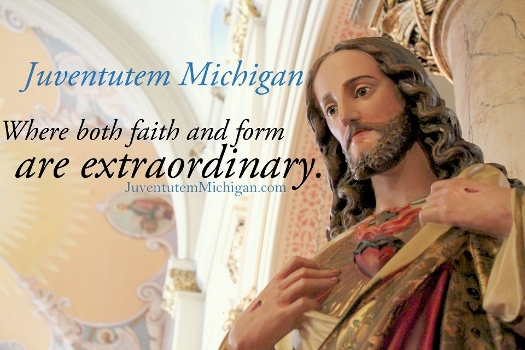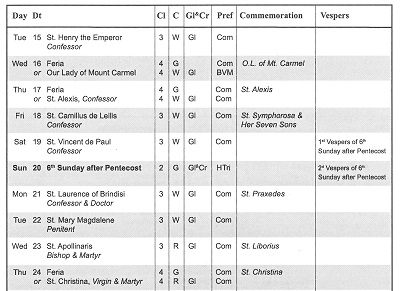
"I will go in unto the Altar of God
To God, Who giveth joy to my youth"
Tridentine Community News (July 20, 2014):

In today’s column, we will touch on a few points of interest from the world of Extraordinary Form trivia:
There are three Orations in the Mass (Collect, Secret, and Postcommunion) and three Antiphons (Introit, Offertory, and Communion). The priest always says or chants Dóminus vobíscum before praying each Collect. Why does he chant Dóminus vobíscum before the Offertory Antiphon? It’s a remnant from when there were intercessory prayers in the Mass at that point, a precursor to the Ordinary Form’s Prayers of the Faithful.
The Sign of the Cross which the celebrant makes at the beginning of the Introit harks back to the time before the Prayers at the Foot of the Altar commenced the Mass. The Tridentine Mass used to begin with merely the Sign of the Cross, as the Ordinary Form does today.
Symbolism of the Holy Trinity is rife throughout Catholic liturgy. One place where it seems to be present is in the 3x3 Kyrie: Three repetitions of three petitions. It would be logical to conclude that these are petitions to each of the three Members of the Holy Trinity, however that is actually not the case. St. Gregory the Great explained that all nine invocations are addressed to Christ.
In a sung Mass, the celebrant quietly reads the Antiphons and the sung parts of the Ordinary (Kyrie, Glória, Credo, Sanctus, and Agnus Dei) while the choir sings them. Is this pointless repetition? No: Holy Mother Church teaches that the priest stands in persóna Christi – in place of Christ – at the altar. The Mass is addressed to God the Father, and the purpose of the repetition is to ensure that the entire Mass is prayed through the celebrant by Christ.
There are 18 Gregorian Chant Mass settings. Some of the Masses are assigned a name as well as a number, e.g. Mass IX – Cum júbilo, Mass XI – Orbis Factor. Those names come from the former tropes, or additional words, which used to be inserted between the words Kyrie and eleison. Though the troping was suppressed, the names of the Mass settings stuck. [above four tidbits from the June 2014 FSSP Newsletter]
The small bell tower that one sometimes sees on the roof of a church approximately over the center opening of the Communion Rail is a symbol of the original Sanctus Bell. Before hand bells came into popular use at the altar, churches had a bell in this roof location which was rung at the Consecration. Nowadays the small bell towers rarely contain actual bells; there are merely a reminder of a former custom. When exterior bells are rung at the Consecration, they almost always are the main tower bell(s) of the church.
A few times per year, you will hear the celebrant chant Benedicámus Dómino instead of Ite, Missa est at the end of Mass. This form of conclusion to the Mass is only used on Holy Thursday and when a procession follows the Mass, as at Corpus Christi. Older hand missals state that this was also said at Masses without a Gloria, such as during Advent and Lent, but that rubric was changed in 1962.
Liturgical Colors
Ever wonder about the colors of the priest’s vestments? Each day in the Ordo – the Church’s liturgical calendar – is assigned a color, as can be seen in the column labeled “C” in the adjacent image. Green is for Sundays After Pentecost, White is for Feasts of our Lord and our Lady and of Confessors and Virgins, Red is for Martyrs and the Holy Ghost, Violet is for Advent and Lent, Rose is for the Third Sunday of Advent and the Fourth Sunday of Lent, and Black is for All Souls Day, funerals, and Requiem Masses. Gold may be substituted for any color except violet or black.
As with so many issues, practicalities play a part: If a church is going to invest in a Solemn Set of vestments, meaning a set including a Dalmatic for a Deacon and a Tunicle and Humeral Veil for a Subdeacon, the first color that is most often obtained is gold, because A) it can be used on most of the days of the year, and B) for solemn events such as Solemn High Mass, it makes sense to use gold, a color which intrinsically suggests solemnity.
Occasionally one sees combination color vestments, for example whitish-gold, or a white vestment with red trim. Especially in the latter case, this is a conscious decision to have a vestment which can be used on either white or red days. While it’s not optimal, it is economical, and vestments historically have not been cheap. Fortunately, the world of global e-commerce has begun to make various church supplies, including some rather good vestments, available at prices significantly lower than custom-made sets tend to cost. While vestments custom-made by skilled craftsmen and women are still the best option for quality and durability, their high prices put them out of reach of many congregations.
Tridentine Masses This Coming Week
- Mon. 07/21 7:00 PM: Low Mass at St. Joseph (St. Laurence of Brindisi, Confessor & Doctor)
- Tue. 07/22 7:00 PM: Low Mass at St. Benedict/Assumption-Windsor (St. Mary Magdalene, Penitent)
- Fri. 07/25 7:00 PM: Low Mass at St. Joseph (St. James the Greater, Apostle)
- Note: Mass has been relocated to St. Joseph Church
- Dinner for young adults age 18-35 follows Mass, sponsored by Juventútem Michigan- Sun. 07/27 12:00 Noon: High Mass at St. Albertus (Seventh Sunday After Pentecost)



No comments:
Post a Comment